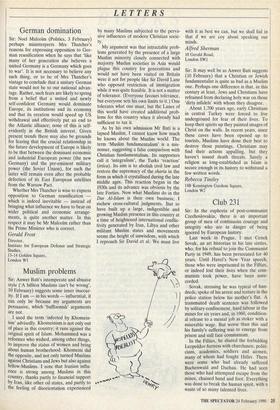Club 231
Sir: In the euphoria of post-communist Czechoslovakia, there is an important group of men of continuous courage and integrity who are in danger of being ignored by European history.
Last week in Prague, I met Cenek Sovak, an art historian in his late sixties, who, for his refusal to join the Communist Party in 1949, has been persecuted for 40 years. Until Havel's New Year speech, those who were imprisoned in the Fifties, or indeed lost their lives when the com- munists took power, have been unre- corded.
Sovak, stressing he was typical of hun- dreds, spoke of his arrest and torture in the police station below his mother's flat. A transmuted death sentence was followed by solitary confinement, hard labour in the mines for six years and, in 1960, condition- al release to a menial job as stoker with a miserable wage. But worse than this and his family's suffering was to emerge from prison and still face communism. In the Fifties, he shared the forbidding Leopoldov fortress with churchmen, politi- cians, academics, soldiers and airmen, many of whom had fought Hitler. There were some who had already suffered Buchenwald and Dachau. He had seen those who had attempted escape from the mines, chained hand and foot. Everything was done to break the human spirit, with a waste of so many talented lives.
LETTERS
In 1968 and '69, some audacious broad- casts condemned him to the boiler room for a further 14 years. The security police harassed him until October last year. Since 1969, many of his contemporaries have died. Those remaining are too tired and ill to tell of their trials. It has always been dangerous to talk of such things. They were a forgotten generation that missed out on the publicity given to the dissidents who at least have had the satisfaction of seeing results, Some of those dissidents who left the Communist Party in 1969 had used the Party for promotion and played a part in the persecutions of the Fifties. Some have left the country only to preach democracy from afar.
Club 231 has been formed among the Fifties detainees to give mutual support. Their charter is one of tolerance and respect for the individual. They have little, but ask for nothing except recognition.
Lucy Abel Smith
Quenington Old Rectory, Cirencester, Glos.



















































 Previous page
Previous page